MASLD vs MetALD With Lavinia Iordache
Chat with MASLD AI

Hi, I am MASLD AI.
Suggested Questions :

MASLD AI 08:24 PM

In this MASLD Community Network session, Lavinia Iordache, PA, clarifies the new SLD nomenclature and the distinctions between MASLD and MetALD, then walks through a real-world case (Ashley, 52) to show how to quantify alcohol intake, recognize cardiometabolic risk factors, and stage disease using non-invasive tests (FIB-4, FibroScan/VCTE with CAP, ELF). She explains how even “moderate” alcohol can accelerate fibrosis when metabolic risks are present, why PEth biomarker testing helps uncover under-reported use, and how to triage patients who land in the F3–F4 range. Practical takeaways include culturally sensitive Mediterranean-style nutrition, 5–10% weight-loss goals, tailored exercise, alcohol cessation, and when to consider resmetirom (Rezdiffra) for eligible F2–F3 non-cirrhotic patients. The talk also covers HCC surveillance (and when to prefer CT/MRI over ultrasound in central adiposity) and sets clear pathways for primary care, GI, and hepatology to work in sync.
Related Podcast

Comparing F3 and F4 Fibrosis With Valerie Shin

In this interactive case discussion, Valerie Shin, NP, from UCLA Health’s hepatology team, walks through how to compare F3 and F4 fibrosis in patients with metabolic dysfunction–associated steatohepatitis (MASH). Presented as part of the GHAPP MASLD Community Network series sponsored by Madrigal, this session uses real-world patient data to explore how non-invasive testing (NITs) like FibroScan, FIB-4, and ELF testing help stage liver fibrosis and guide treatment decisions. Valerie highlights the importance of accurate staging for prognosis, monitoring, and management—whether identifying patients with advanced fibrosis (F3) who may benefit from resmetirom (Rezdiffra), or recognizing progression to cirrhosis (F4) that requires enhanced surveillance and multidisciplinary care. This video also emphasizes practical strategies for lifestyle modification, metabolic risk factor control, and liver cancer screening. Whether you are a hepatology specialist, primary care provider, or advanced practice provider (APP), this case comparison offers valuable clinical insights into diagnosing and managing MASLD/MASH.
Watch Now
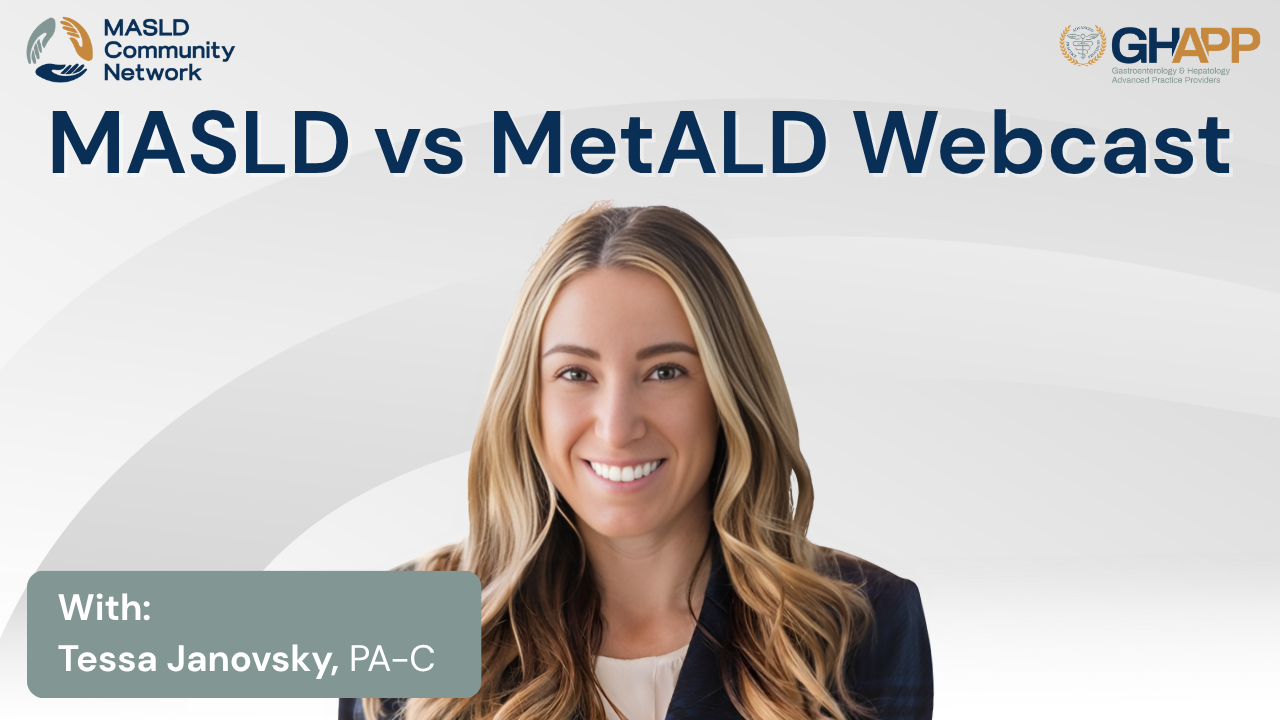
MASLD vs MetALD With Tessa Janovsky

Tessa Janovsky, PA-C, Arizona Liver Health, delivers a clear, case-based overview of metabolic dysfunction–associated steatotic liver disease (MASLD), MASH, and mixed-etiology MET-ALD. Using a common clinic scenario, she explains how to recognize fatty liver on imaging, why an accurate alcohol history matters, and how non-invasive tools (FibroScan stiffness/CAP and alcohol biomarkers like PEth) guide staging and care. You’ll learn practical, patient-friendly steps—Mediterranean-style nutrition, sustainable weight loss, regular aerobic and resistance exercise, and alcohol cessation—plus when to consider medications, specialist referral, and ongoing surveillance to prevent progression to advanced fibrosis and cirrhosis. Ideal for APPs and GI clinicians seeking straightforward strategies to manage MASLD/MASH in everyday practice.
Watch Now

APP Insight: Common Questions from Patients About MASH

In this video, Jonathan Yeh, PA, answers three of the most frequently asked questions about MASH—Metabolic Dysfunction–Associated Steatohepatitis—and offers practical advice for understanding and managing this progressive form of fatty liver disease. He begins by explaining what MASH is: an inflammatory, more advanced stage of MASLD (Metabolic Dysfunction–Associated Steatotic Liver Disease), driven by abnormal fat accumulation in the liver due to impaired fat transport. Jonathan then breaks down the treatment approach, emphasizing the importance of lifestyle modification—particularly diet and exercise. He highlights the benefits of a green Mediterranean diet, regular physical activity, and sustainable weight loss, which can improve or even reverse MASH in many patients. For individuals with more advanced fibrosis, pharmacologic treatment with resmetirom (Rezdiffra) may be indicated. This concise FAQ offers helpful guidance for patients and providers alike on tackling MASH with evidence-based strategies.
Watch Now

HCC Surveillance: Implementation in Patients with Advanced Fibrosis/Cirrhosis from MASH

In this expert-led session, Elizabeth Alqueza, PA-C, from Beth Israel Deaconess Medical Center in Boston, discusses the critical importance of hepatocellular carcinoma (HCC) surveillance in patients with steatotic liver disease, including MASLD and MASH. HCC is a leading cause of cancer-related death worldwide, and early detection is vital for improving survival outcomes. Using a real-world case study, Elizabeth highlights risk factors such as obesity, type 2 diabetes, and advanced fibrosis—and underscores the growing role of MASH in HCC development, even in the absence of cirrhosis. She outlines best practices for staging, the importance of early referral to hepatology, and AASLD-recommended surveillance protocols using ultrasound and AFP testing every 6 months. The video also explores systemic barriers to screening and actionable strategies to improve adherence, such as EMR alerts, streamlined imaging protocols, and improved coordination between primary care and hepatology. This presentation is essential viewing for healthcare professionals managing patients with liver disease, offering practical tools to enhance HCC detection and optimize long-term outcomes.
Watch Now

Lifestyle Management With Milly Ng

Join Milly Ng, NP, a hepatology nurse practitioner at Tufts Medical Center in Boston, for an evidence-based session on lifestyle management for MASLD and MASH, presented through the GHAPP MASLD Community Network and sponsored by Madrigal Pharmaceuticals. Through the case of "Albert," a patient with steatosis and metabolic risk factors, Milly highlights the importance of personalized counseling and non-invasive testing like FIB-4 and FibroScan to assess fibrosis risk. She reviews how Metabolic Dysfunction-Associated Steatotic Liver Disease (MASLD) and its progressive form, MASH, can be reversed through diet, exercise, and weight loss, particularly before fibrosis advances to cirrhosis. Learn how to tailor dietary guidance to a patient's cultural background, socioeconomic status, and personal goals, and understand how central obesity and insulin resistance drive disease progression. Milly also reviews the genetic and environmental factors influencing steatosis, why aerobic training may be more effective than resistance workouts for liver health, and how validated tools like the EDAS (Exercise and Diet Adherence Scale) can track patient progress. This session empowers primary care and hepatology providers to deliver patient-centered lifestyle interventions that can prevent liver disease progression and reduce cardiometabolic risk.
Watch Now
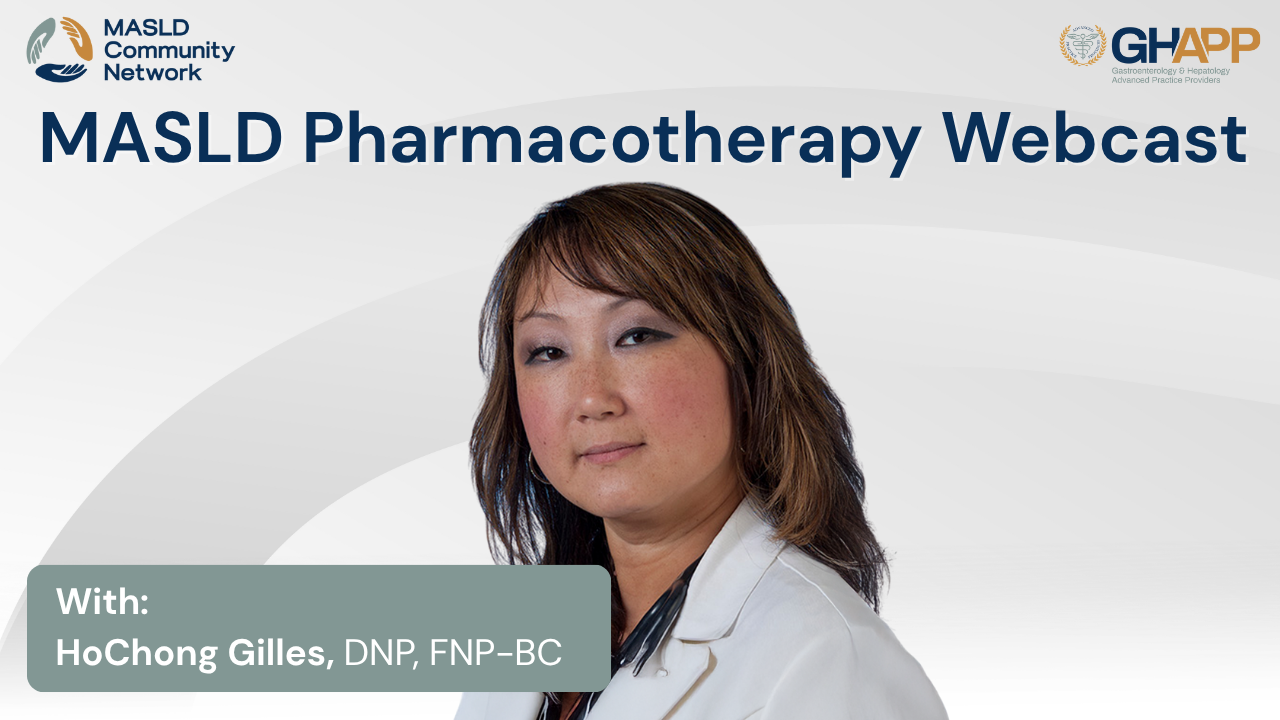
MASLD Pharmacotherapy With HoChong Gilles

In this MASLD Community Network webcast, HoChong Gilles, DNP from the Central Virginia VA Health Care System, provides an in-depth review of pharmacotherapy for MASLD and MASH. The session highlights how management historically focused on lifestyle modification, weight loss, and cardiometabolic risk reduction, and how the treatment landscape shifted in March 2024 with the FDA approval of resmetirom (Rezdiffra)—the first therapy specifically indicated for non-cirrhotic MASH with stage 2–3 fibrosis. HoChong also reviews the evidence and practical use of GLP-1 receptor agonists like semaglutide, including data from the ESSENCE trial, as well as the limited but notable roles of vitamin E and pioglitazone. Key discussion points include drug mechanisms, clinical trial outcomes, real-world safety considerations, drug–drug interactions, and monitoring strategies for patients on therapy. This presentation underscores the importance of integrating lifestyle change with emerging pharmacologic options to improve liver outcomes in patients with MASLD and MASH.
Watch Now
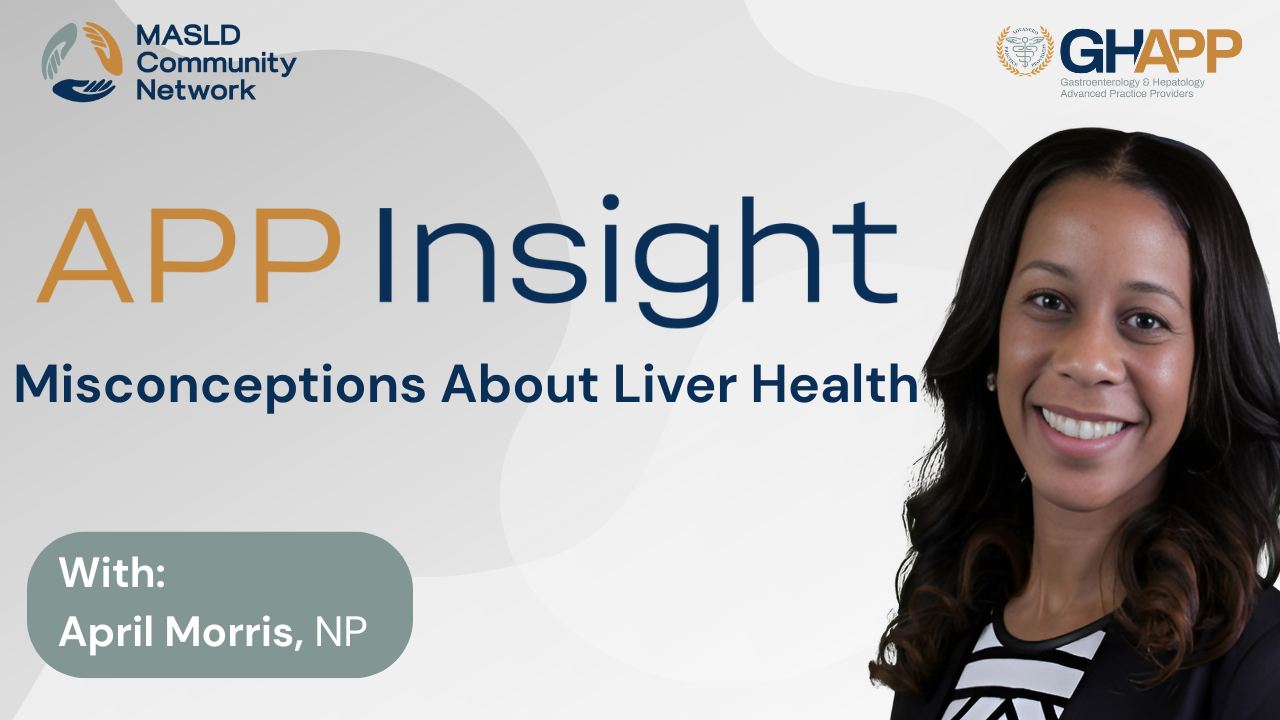
Misconceptions About Liver Health With April Morris

Liver health is often misunderstood, with many patients and even providers believing that elevated liver enzymes mean certain medications are unsafe. In this video, April Morris, a family nurse practitioner specializing in hepatology and endocrinology, clears up misconceptions about liver disease and medication safety. She explains why evaluating overall liver function—through markers like bilirubin, albumin, and platelet counts—is far more important than looking at liver enzymes alone. April also emphasizes that many commonly prescribed medications, including statins and metformin, are generally safe for patients with liver conditions when monitored properly. Beyond medications, she highlights the powerful role of lifestyle modifications—reducing alcohol intake, managing carbohydrates and sugar, focusing on healthy nutrition, and incorporating exercise. These changes, she explains, can dramatically improve outcomes for patients with fatty liver disease (MASLD/MASH), diabetes, and other metabolic conditions. April underscores that patients hold the power to protect their liver health, but education and awareness are essential since liver disease can often remain a “silent killer” until it’s too late. Watch now to gain expert insights on how to better understand liver labs, avoid common myths, and take proactive steps to support long-term liver function.
Watch Now
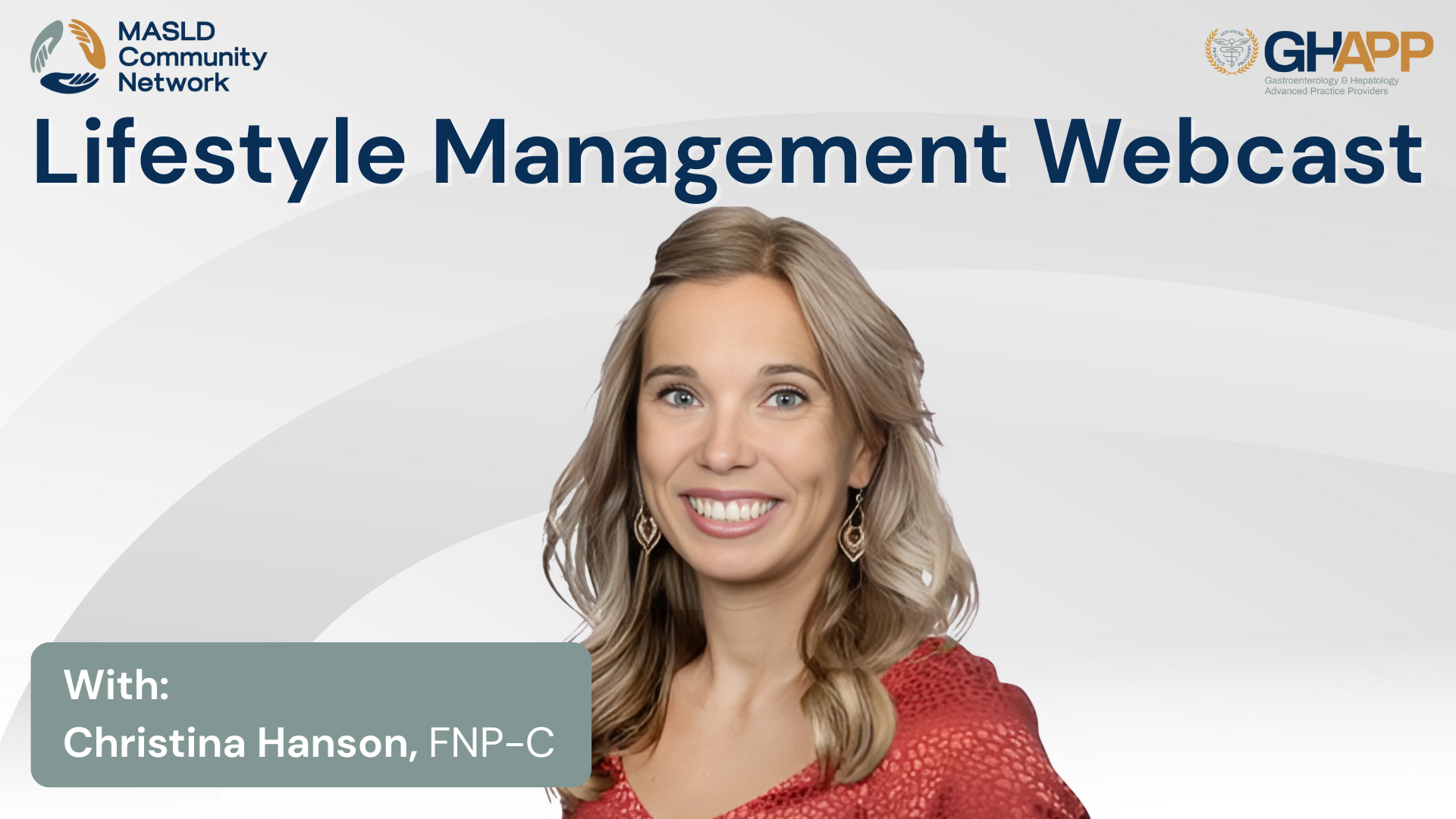
Lifestyle Management With Christina Hanson

Join Christina Hanson, NP from South Denver GI, for a practical and in-depth discussion on lifestyle management of MASLD (Metabolic Dysfunction-Associated Steatotic Liver Disease) and MASH (Metabolic Steatohepatitis). In this GHAPP MASLD/MASH Community Network session, Christina walks through the case of Albert, a 65-year-old patient with obesity, diabetes, and abnormal liver findings—representing a common clinical scenario in primary and specialty care. This session highlights how to apply non-invasive fibrosis assessment tools like FIB-4 and FibroScan, interpret metabolic risk factors, and differentiate patients based on fibrosis staging. Christina discusses how cultural dietary habits, access to care, and social determinants of health impact disease management, and emphasizes the importance of personalized counseling, accountability strategies, and gradual, sustainable changes to diet and exercise. The session also reviews the role of Resmetirom, the first FDA-approved treatment for MASH with F2-F3 fibrosis, and outlines guideline-recommended lifestyle interventions including the Mediterranean diet and combined aerobic/resistance exercise. Learn how to identify, stage, and manage patients with MASLD and MASH in a way that supports long-term adherence and improves liver-related outcomes. Educational support provided by Madrigal Pharmaceuticals.
Watch Now
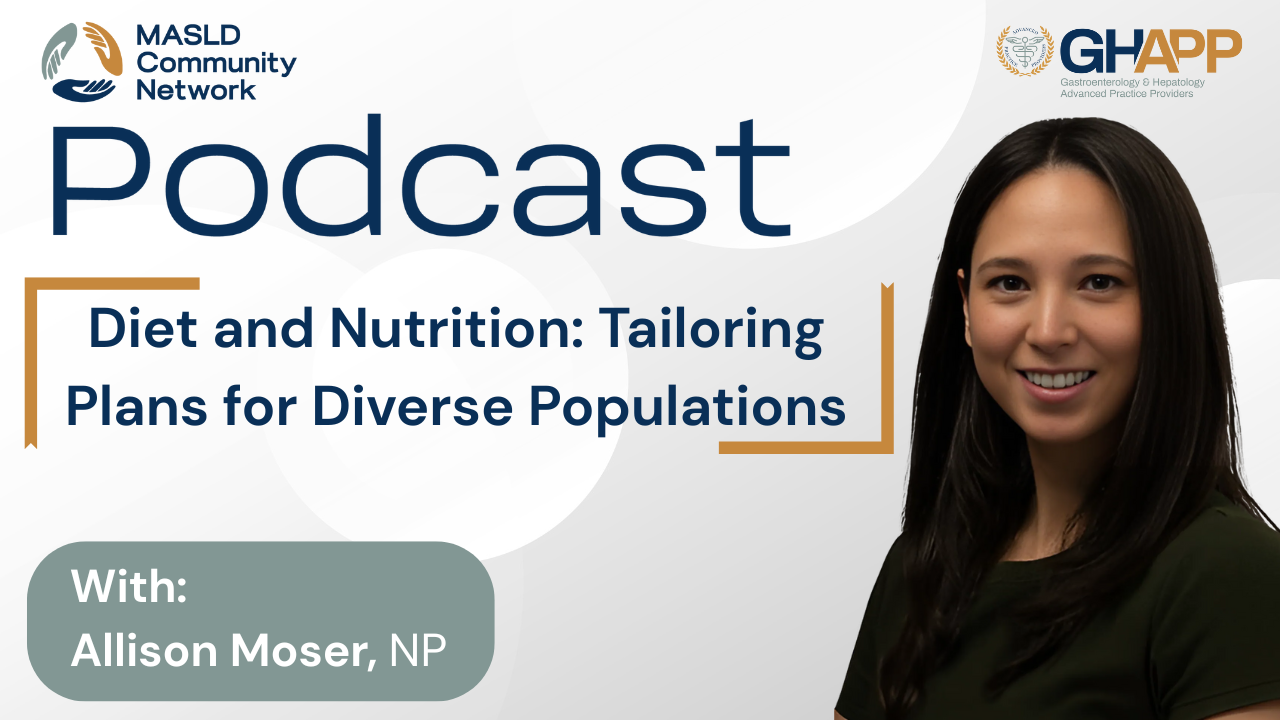
Diet and Nutrition: Tailoring Plans for Diverse Populations

In this episode, Allison Moser, NP, from Rush University Medical Center, dives into one of the most impactful aspects of MASH (Metabolic Dysfunction–Associated Steatohepatitis) management — diet and nutrition. While weight loss is often the starting point, Allison explains why sustainable liver health depends on personalized, culturally sensitive, and practical nutrition strategies. Learn how evidence-based eating patterns like the Mediterranean diet and plant-based diets can reduce hepatic steatosis, improve insulin sensitivity, and lower inflammation, even without weight loss. Allison shares actionable food swaps for diverse cultures, affordable ways to eat healthy when access is limited, and tailored recommendations for patients with comorbidities like diabetes, CKD, and cardiovascular disease. She also discusses the major role of added sugars, processed foods, and sugary or diet beverages in driving liver damage — and how to help patients make realistic, stepwise changes that last. Whether you’re an APP, NP, PA, or clinician treating patients with MASH or MASLD, this episode offers practical, evidence-based tools to improve nutrition counseling, build patient trust, and support long-term liver health.
Watch Now
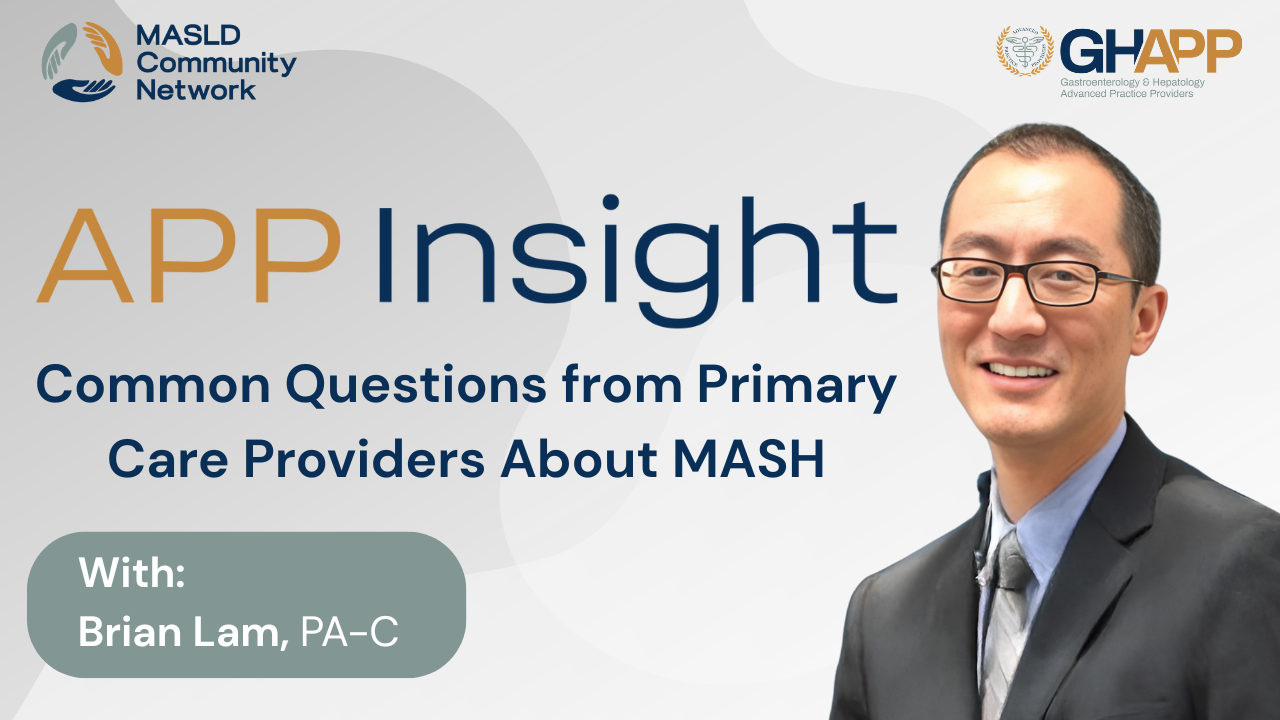
Common Questions from Primary Care Providers About MASH

In this FAQ session, Brian Lam, PA-C, breaks down a common question he receives from primary care providers, endocrinologists, and even other GI specialists: Which patients with fatty liver should be referred to hepatology or GI for further evaluation? Using a clear and practical approach, Brian explains how to apply FIB-4, a simple lab-based non-invasive test, to guide referrals. He emphasizes that patients with metabolic syndrome—especially those with diabetes—are at significantly higher risk for MASH (Metabolic dysfunction-associated steatohepatitis), with roughly 1 in 3 diabetic patients affected. If the FIB-4 is greater than 1.3, or greater than 2.0 in adults over 65, it's time to refer. Brian also highlights the utility of FIB-4 with reflex to ELF, now available through major labs like LabCorp and Quest, as an efficient two-step method to detect advanced fibrosis and at-risk MASH. This video is perfect for busy clinicians looking for a referral-friendly workflow to catch MASH early and improve liver health outcomes in high-risk populations.
Watch Now





 September 2025
September 2025 